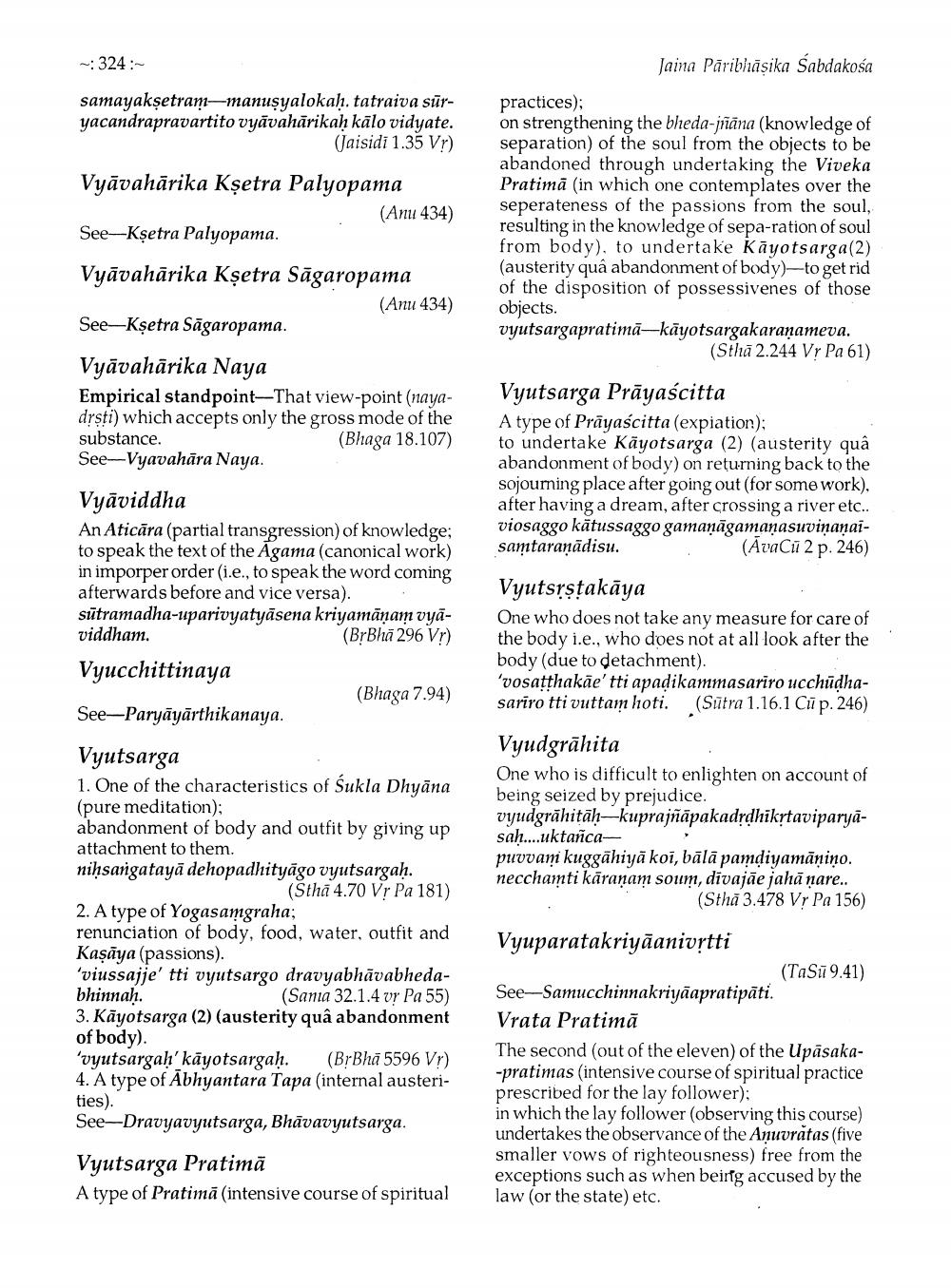________________
~:324
samayakṣetram-manuṣyalokaḥ, tatraiva suryacandrapravartito vyāvahārikaḥ kālo vidyate. (Jaisidi 1.35 Vr)
Vyavahārika Kṣetra Palyopama
(Anu 434)
See-Kṣetra Palyopama.
Vyavahārika Kşetra Sägaropama
(Anu 434)
See-Kṣetra Sagaropama.
Vyāvahārika Naya
Empirical standpoint-That view-point (nayadrşti) which accepts only the gross mode of the substance. (Bhaga 18.107)
See-Vyavahara Naya.
Vyucchittinaya
See-Paryayarthikanaya.
Vyaviddha
An Aticara (partial transgression) of knowledge; to speak the text of the Agama (canonical work) in imporper order (i.e., to speak the word coming afterwards before and vice versa). sütramadha-uparivyatyasena kriyamāṇam vyā(BrBh 296 Vr)
viddham.
(Bhaga 7.94)
Vyutsarga
1. One of the characteristics of Sukla Dhyana (pure meditation):
abandonment of body and outfit by giving up attachment to them.
nihsangataya dehopadhityago vyutsargah. (Stha 4.70 Vr Pa 181)
2. A type of Yogasangraha renunciation of body, food, water, outfit and Kaşaya (passions).
'viussajje' tti vyutsargo dravyabhavabhedabhinnah. (Sama 32.1.4 vy Pa 55) 3. Kayotsarga (2) (austerity quâ abandonment of body). "vyutsargah' kayotsargaḥ, (BrBha 5596 Vr) 4. A type of Abhyantara Tapa (internal austerities).
See-Dravyavyutsarga, Bhavavyutsarga.
Vyutsarga Pratimā
A type of Pratima (intensive course of spiritual
Jaina Päriblasika Sabdakosa
practices);
on strengthening the bheda-júna (knowledge of separation) of the soul from the objects to be abandoned through undertaking the Viveka Pratima (in which one contemplates over the seperateness of the passions from the soul, resulting in the knowledge of sepa-ration of soul from body), to undertake Kayotsarga(2) (austerity quá abandonment of body)-to get rid of the disposition of possessivenes of those objects.
vyutsargapratima kayotsargakaraṇameva. (Stha 2.244 Vr Pa 61)
Vyutsarga Prayaścitta
A type of Prayaścitta (expiation); to undertake Käyotsarga (2) (austerity quà abandonment of body) on returning back to the sojourning place after going out (for some work). after having a dream, after crossing a river etc.. viosaggo katussaggo gamaṇāgamanasuviņaṇaisamtaraṇādisu. (ATC 2 p. 246)
Vyutsṛṣṭakaya
One who does not take any measure for care of the body i.e., who does not at all look after the body (due to detachment).
'vosaṭṭhakae' tti apaḍikammasariro ucchūḍhasariro tti vuttam hoti. (Sutra 1.16.1 Ci p. 246)
Vyudgrähita
One who is difficult to enlighten on account of being seized by prejudice.
vyudgrähitäh kuprajñāpakadrdhikṛtaviparyasaḥ....ktańca
puvvam kuggahiyā koī, bālā pamḍiyamāņino. necchamti käraṇam soum, dīvajāe jahā ṇare.. (Stha 3.478 Vr Pa 156)
Vyuparatakriyaanivṛtti
See-Samucchinnakriyāapratipati. Vrata Pratima
The second (out of the eleven) of the Upasaka-pratimas (intensive course of spiritual practice prescribed for the lay follower);
in which the lay follower (observing this course) undertakes the observance of the Anuvratas (five smaller vows of righteousness) free from the exceptions such as when being accused by the law (or the state) etc.
(TaSu 9.41)




